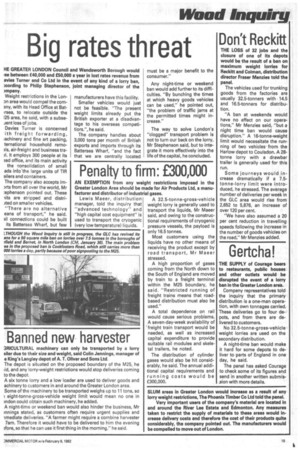Penalty to firm: £300,000
Page 13

If you've noticed an error in this article please click here to report it so we can fix it.
AN EXEMPTION from any weight restrictions imposed in the Greater London Area should be made for Air Products Ltd, a manufacturer and distributor of industrial gases.
Lewis Maeer, distribution manager, told the inquiry that "advanced technology" and "high capital cost equipment" is used to transport the cryogenic (very low temperature) liquids. A 32.5-tonne-gross-vehicle weight lorry is generally used to transport the liquids, Mr Maeer said, and owing to the constructional requirements of cryogenic pressure vessels, the payload is only 16.5 tonnes.
Most customers using the liquids have no other means of receiving the product except by road transport, Mr Maeer stressed.
A high proportion of gases coming from the North down to the South of England are moved by train to a freight terminal within the M25 boundary, he said. "Restricted running of freight trains means that roadbased distribution must also be used."
A total dependence on rail would cause serious problems. A seven-day-week availability of 'freight train transport would be needed, as well as increased capital expenditure to provide suitable rail modules and skeletal trailers, he noted.
The distribution of cylinder gases would also be hit considerably, he said. The annual additional capital requirements and running costs would be £300,000.


































































